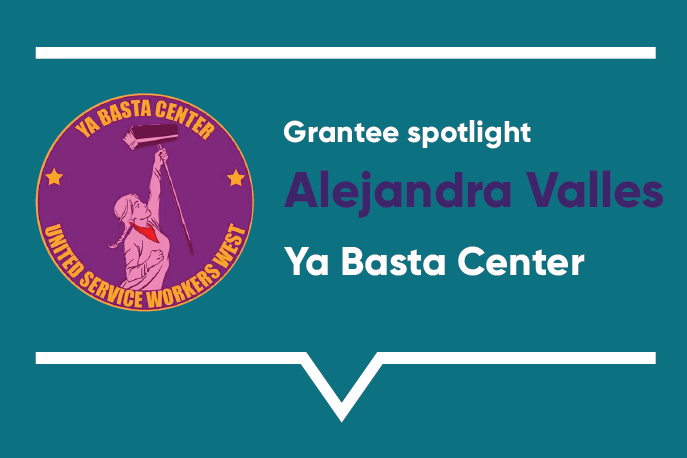The Ya Basta Center, among RALIANCE’s grantees, focuses on the prevention of workplace sexual violence in California’s janitorial industry, and they have the best possible resource for building effective responses: the janitors themselves.
“Ya Basta is entirely focused on peer-to-peer sexual violence prevention,” said Ya Basta Center spokesperson Alejandra Valles. “That means janitors are working directly with each other to change their workplace culture.”
We sat down with Valles this week to discuss the Ya Basta Center’s RALIANCE-supported effort to train a new cohort of leaders in the janitorial field, as well as the unique challenges facing those in the profession.
RALIANCE: Why is a peer-to-peer model so important for the Ya Basta Center’s sexual violence prevention efforts?
Valles: Janitors face a range of challenges that leave them especially vulnerable to sexual harassment, misconduct and abuse – so a peer-to-peer model is the best way to build the community necessary to respond. We’re so passionate about this issue that we’ve worked to have peer-to-peer models established by law. Based on a requirement going into effect in 2022, janitorial companies that want to operate in the state of California will need to prove that they are providing training conducted by peer janitors and must cover the expense of the training. This legislation was a huge victory for the janitorial community.
RALIANCE: What are some of the unique challenges facing janitors?
Valles: There are a number of overlapping factors that leave janitors especially vulnerable to abuse. First, there’s a gender dynamic in the field that can become toxic. While the majority of workers and cleaners are female, the foremen and supervisors are overwhelmingly male. This means that men in the field have a huge amount of power over women, including over their paychecks. On top of that, janitors often work the night shift, when there may be no one around except for a male supervisor.
Additionally, many janitors are immigrant workers – this means there are language barriers that may prevent them from seeking help in a way that’s comfortable for them, and some may be concerned about their undocumented status. They worry that if they come forward and file a complaint that it could threaten their ability to stay in the country and could separate them from their family.
And this last component is critical to understand: Most janitorial companies are subcontracted by larger companies to provide their services, which relieves large corporations and building owners of liability and makes it much harder to hold perpetrators accountable. If a janitorial company gets into trouble or is sued for issues related to sexual misconduct, they often just declare bankruptcy and change their names. This can make it incredibly hard to turn to the legal system for relief.
RALIANCE: How will RALIANCE’s grant help the Ya Basta Center build a better culture for the janitorial workforce?
Valles: We are incredibly grateful for RALIANCE’s grant, which will help us build an anti-harassment training program for janitors who are survivors and will make it possible to develop more janitors to serve as peer-to-peer trainers. The more trainers we have, the more we’ll be able to go directly into the janitorial community and help change toxic cultures. The funding will also help us bridge a financial gap – because janitorial companies don’t have to start covering the costs of peer-to-peer training until 2022, our efforts are currently in need of support.
RALIANCE: How will you measure the success of your training and prevention efforts?
Valles: The number of new trainers – we call them promotoras and compadres – will be a key measure of success. Janitors overwhelming identify fellow janitors as the people they would feel most comfortable talking to about sexual misconduct, so the more promotoras and compadres we have, the better. Because we have our peer-to-peer trainers directly in the field, they can report back on changes in culture. Are janitors feeling more comfortable on the night shift? What’s happening in the break rooms? Only those working in the profession every day can provide the honest answers to these questions, which is why we’re so passionate about our peer-to-peer model. It’s our best hope for a better future for janitor workers.
RALIANCE provides consulting, assessment, and employee development services to help build more equitable workplace cultures and create environments free from sexual harassment, misconduct and abuse. We stand ready to support your organization’s goals – contact us today at info@raliance.org to get started.

